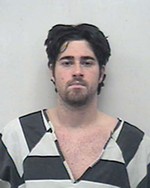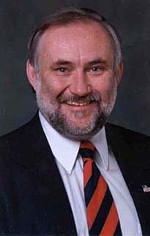Panel Emphasizes Need for Prosecutorial Oversight
Michael Morton's case is one of dozens in which misconduct has been alleged
By Jordan Smith, Fri., April 6, 2012

Although courts have confirmed that prosecutorial misconduct occurred in 91 Texas criminal cases between 2004 and 2008, not a single prosecutor among those has ever been disciplined for their misbehavior, according to new data compiled by the Innocence Project. (Allegations of prosecutor misconduct were raised in another 124 cases, but those issues were not ruled on by any court.)
This is likely just the tip of the iceberg, said Emily West, IP research director, during a public dialogue on prosecutorial oversight last week at the University of Texas School of Law. Indeed, because 98% of Texas criminal cases are resolved through plea bargain, it is unlikely that we'll ever know the true extent of the problem – which includes withholding exculpatory or other evidence possibly favorable to a defendant. Of the 91 cases in which the courts agreed there was misconduct, 36 involved "improper" arguments during trial, 35 involved improper questioning of a witness, and eight involved a failure to disclose favorable materials, known as a Brady violation. That's exactly what Michael Morton says happened to him.
Exonerated last year, Morton spent nearly 25 years in prison for the bludgeoning death of his wife before DNA evidence linked another man to the crime instead. Morton's conviction could have been avoided, he argues, had Williamson County prosecutors – chief among them former District Attorney Ken Anderson, who is now a district judge – had turned over evidence they had back in 1986 that suggested strongly that Morton was innocent of the crime. Anderson is now facing a rare "court of inquiry" (slated to begin Sept. 11), in which a court will determine if his actions (or inactions) violated criminal statutes. (If so, perhaps the IP will have to add a single hash mark to the "disciplined prosecutor" column.)
Morton spoke to an audience of students, legislative aides, judges, and lawyers last week, asking for the system to focus intently on curing the problem of misconduct. "I do not crave fame and fortune; I do not want to be recognized on the street. I'm here because I am you," he said. People think this sort of thing happens to someone else – people with criminal records or who live "on the wrong side of town," he said. But he demonstrates that misconduct knows no real boundaries: He lived in a nice suburban neighborhood in a brick house on a corner lot; his family was happy. And then his wife was dead, and he was in prison. "Remember, you can be me, because I am you." John Thompson, who spent 18 years in prison in Louisiana – including 14 on death row – and was also part of the panel discussion, noted that misconduct isn't the sole problem; ineffective assistance of counsel, often by poorly trained and unprepared defense attorneys, is equally problematic. Indeed, prosecutorial misconduct combined with ineffective assistance can be a one-two punch – one party is withholding evidence, and the other isn't keeping a lookout.
Also on the panel were retired Travis County District Judge Bob Perkins and venerable Austin criminal defense attorney Betty Blackwell, who noted that part of the problem of discipline may be a state law that includes a four-year statute of limitations on prosecutorial misconduct, from the date of the actual misconduct. In most of these cases, she says, that's simply not enough time. "Very rarely is any of this discovered within four years," she said.
Figuring out how to curb misconduct, of course, is the issue that remains. Robert Schuwerk, a law professor at the University of Houston, suggested that a cultural change within prosecutors' offices is part of the solution: While prosecutors by and large are well-meaning and moral people out to seek justice, "what needs to happen ... is they need to have a different conception of what [justice] is," he said. "What they don't see are the stories that have been told to us today [by Morton and Thompson]. ... They have not been made to feel the injustice of that."
Got something to say on the subject? Send a letter to the editor.












